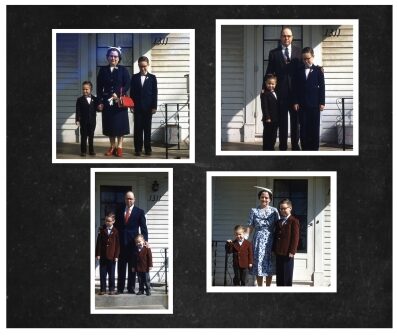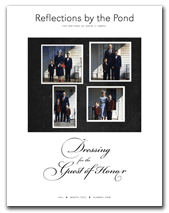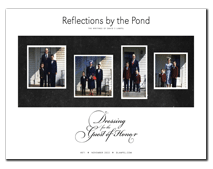The occasion was an open house for a couple in our church celebrating their fiftieth wedding anniversary. Leaving our parked car, Linda wondered if we might be overdressed for the reception, something easy to be in this too-casual society. After a moment’s thought I responded, “I dress for the guest of honor.”
Though at the time that remark was mostly reflexive, the words have echoed in my mind ever since. On that day, the sentiment proved true: the husband of the couple was attired very much as I. But what does such a thought mean beyond selecting the proper slacks and shirt from one’s closet?
I admit it: I was raised by my parents in a far different time from today. To a young child being raised in the 2020s, the social and moral climate of the 1950s would seem to him as alien as if he were to be suddenly transported into the Victorian era.
Different indeed.
In my home there was a regimen in place not just on Sunday, but in preparation for Sunday. Every Saturday evening Dad would have us two boys bring out our best shoes and the three of us would polish them for church the next day. Dad was a stickler about shoes. He insisted we use a shoe horn when slipping them on, and place shoe trees in them once they were returned to the closet. (My guess is that many reading this have never even heard of shoe trees.)
Come Sunday morning we would rise early—Mom before the rest of us. After breakfast, around the table we would share a brief devotional out of that month’s issue of The Upper Room. Later, while the rest of us dressed, Mom, in her slip and an apron, would finish the preparations for Sunday dinner, placing the meat and potatoes in the roaster and placing it in an oven set low for baking our meal over the next four hours. Once that was ready she would finish dressing herself.
It was never so stated, but there was a tacit understanding in our family that on Sunday mornings we dressed for the Guest of honor. Heaven knew we hadn’t the means to impress anyone else; we may not have been paupers, but we had to squeeze a lot of pennies. And no small portion of my brother’s and my Sunday-go-to-meeting clothes were given to us by Mom’s sister, our old-maid Auntie Norma. No, we weren’t dressing up in our Sunday best for any other reason than to honor the One we would soon be worshiping and learning about from the Bible. To dress on a Sunday morning in the same clothes we wore for work or play would have been shameful, and disrespectful to our Lord. So the three men of the family would be attired in white shirts and ties, and either suits or slacks and sport coats—and, of course, freshly polished shoes for the occasion. Mom would wear one of her better dresses, and since it was a time when adults still wore hats, she would wear one of her few, and Dad would have on his rakish fedora. Once we arrived at the church building, Dad would place his hat in the cloak room; Mom would leave hers on.
For a man ought not to have his head covered, since he is the image and glory of God; but the woman is the glory of man. For man does not originate from woman, but woman from man; for indeed man was not created for the woman’s sake, but woman for the man’s sake. Therefore the woman ought to have a symbol of authority on her head, because of the angels.
1 Corinthians 11:7–10
In our present time, few individuals of either sex have “something on their head” in church. Back in the fifties most men wore a hat (a fedora) to church, but took it off in church. In fact, the coat racks in our church building, the Baptist Temple, had individual stations for the man to place his hat above his coat before entering the sanctuary. Women, on the other hand, wore a hat to church and in church. Frankly, that had more to do with fashion than doctrine. Women just wore hats in the fifties—and often gloves. Yet in that time and place—and I would contend even today—it would have been a shameful thing for a man to leave his hat on while in church, whereas it was perfectly respectable for a woman to be so attired.
The overarching motif of this passage from the apostle Paul is shame. Back in the fifties it would have been a shameful thing for a man to leave his hat on during the worship service and in the first century Paul said that for a man to cover his head with a portion of his toga in corporate worship was a shameful thing, bringing dishonor, disgrace upon his “head,” Christ Jesus.
Expressing proper honor and respect to the Guest of honor goes well beyond one’s choice of attire.
Yes, I know: I am talking about the manners and customs from somewhere around sixty years ago—to the youth and young adults of today, the Dark Ages—the era of dial Bakelite telephones sharing party lines; of gas stations where they personally pumped your gas, washed your windshield for you, checked your oil, and you still paid only about a quarter for a gallon of gas; of television in black and white only.
This writer, happily composing his thoughts in a word processor rather than on a manual typewriter, can agree that there is much to commend this present era. Yet that does not mean it is superior in all respects to others.
Human beings today are far more enamored of themselves than they were fifty or sixty years ago; this results in a critical difference in our worship, and reveals what people today consider of most importance. They make sure to finish their conversation with their neighbor, even though a prayer is being said, or Scripture is being read, from the platform. The musical prelude, the offertory, even the solemn Communion service are, for them, simply lulls in the proceedings and opportunity for more chatter—more “fellowship.”
In this we see demonstrated an absence of honor and respect for the Guest of honor. It telegraphs loudly that in our small world what we have to say to each other is far more important than what God has to say to us—or what we should be saying to Him.
Because we have misplaced the definition of worship, we have forgotten—or could it be that we have rejected?—what we are to be doing on a Sunday.
Our word “worship” (worth-ship) translates the Hebrew abad, which means to work, to serve; the Hebrew shachah, to bow down, implying an act of humble subservience. In the New Testament the predominant Greek words are proskyneo, which means to prostrate oneself, to show reverence to, to adore; and latreuo, to serve, to render religious service or homage.
Does any of that describe today’s typical evangelical “service of worship,” in which most of us will conclude that we have “worshiped” if we simply show up, chat with our friends over coffee, sing a few songs about what God has done for us, and listen to a sermon?
Oh, how we have demoted our God; how we have diminished Him rather than exalt Him. We have made ourselves more important than our Creator, our Father, our Lord. We have demonstrated clearly that we consider our words more important than His. And we have failed to honor Him in the plastic and tinsel veneer of what is today deemed “worship.”
When Israel was commanded to meet God, He told them to clean themselves up and wash their garments. They were to present themselves before Him in as physically sanctified manner as possible. They were to “look and be at their best,” as it were.
So Moses went down from the mountain to the people and consecrated the people, and they washed their garments. He said to the people, “Be ready for the third day; do not go near a woman.” So it came about on the third day, when it was morning, that there were thunder and lightning flashes and a thick cloud upon the mountain and a very loud trumpet sound, so that all the people who were in the camp trembled. And Moses brought the people out of the camp to meet God, and they stood at the foot of the mountain.
Exodus 19:14–17
When Jesus found Himself in a conversation with a Samaritan woman about worship, He defined for her the form of worship Father God desired from His people: “worship in spirit and truth.”
“But an hour is coming, and now is, when the true worshipers will worship the Father in spirit and truth; for such people the Father seeks to be His worshipers. God is spirit, and those who worship Him must worship in spirit and truth.”
John 4:23–24
Today, instead of worshiping honestly and faithfully by means of the Holy Spirit, we demand honor and respect for ourselves, but fail to extend that same courtesy to our God.
By our dress and our behavior we are to approach the Sunday worship service with one thought and purpose uppermost in our mind: to exalt the Lord our God above everything else. To joyfully yet humbly proclaim His unique qualities. And to make Him the highest priority in our lives—not just on a Sunday morning, but every day He graciously grants us.
Issue #871, November 2022
Reflections by the Pond is published monthly at dlampel.com and is © 2022 David S. Lampel.
Unless otherwise indicated, all Scripture is from the New American Standard Bible (Updated Edition). This and all of our resources are offered free-of-charge to the glory and praise of Christ our Lord.



